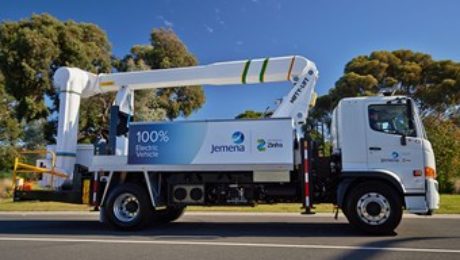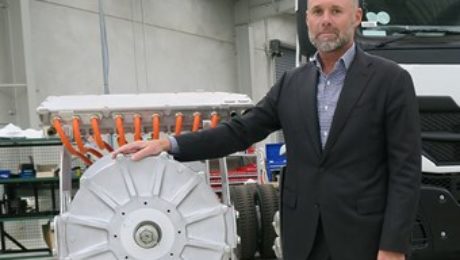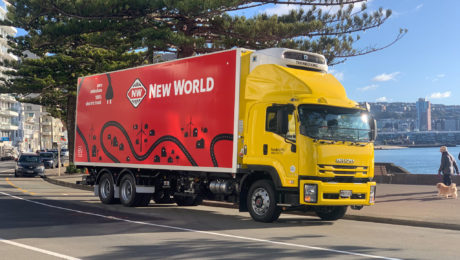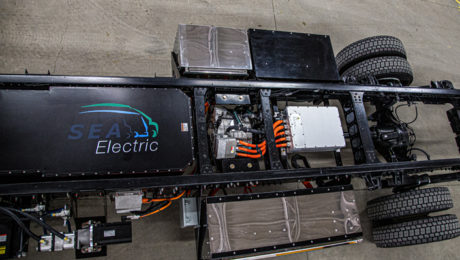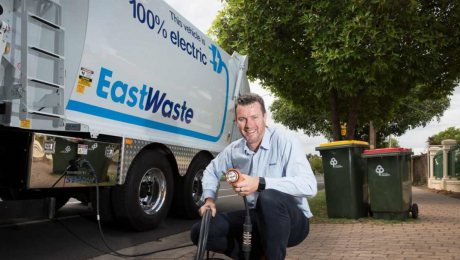Jemena takes delivery of SEA electric truck with cherry picker platform
The Jemena Electricity Distribution Network in Victoria has just received its first electric Hino truck with Elevated Work Platform (EWP) in Australia.
Made by Melbourne’s SEA electric in collaboration with Niftylift, the elevated work platform truck will help reduce the operational carbon output of Jemena, which delivers electricity in Victoria and pipes gas in Victoria, ACT, Queensland and NSW, by 30 tonnes per year.
To make the truck, SEA electric took a Niftylift diesel cherry picker and converted it using one of its patented electric drivetrains and equipped it with a 138 kilowatt hour battery.
This gives it around 200 km of range for each single charge and the battery also powers the elevated work platform.
In addition to the reduced carbon emissions, benefits of switching to an all-electric work platform truck are less noise, for the workers and residents in suburban areas, particularly when fixing network faults at night, and the absence of toxic diesel emissions during operation.
“SEA Electric are a Melbourne-based manufacturer of electric vehicles and leader in converting commercial vehicles from diesel to electric” said Jemena’s executive GM for electricity distribution, Shaun Reardon.
“The cherry picker was converted into an electric vehicle as part of a major reconstruction over a 12-month period.”
SEA Electric says the electric cherry picker is an industry first, and is already in service.
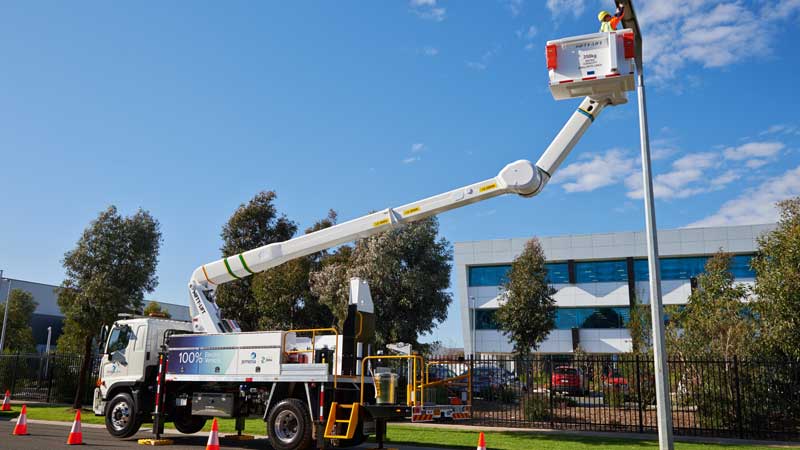
“It’s been a special and historical project for the management and engineering staff at SEA Electric to partner with Jemena in the development of this Australian-first 100 per cent electric Elevated Work Platform service truck,” said SEA Electric sales director for Australia and New Zealand Joe Di Santo.
“Not only is this electric powered cherry picker the first step in greening our fleet, it will also benefit our customers with a quieter operation and zero exhaust emissions,” said Reardon.
“We will look for new ways to further reduce the carbon emissions across our electricity network in the future.”
The addition of the truck to Jemena’s fleet follows just days after Jemena announced a deal with Hyundai to supply green hydrogen for the car maker’s hydrogen fuel cell vehicles.
Jemena is also implementing other sustainable measures including rolling out 500 LED ‘smart street lights’ that use up to 75 per cent less energy than traditional lighting. READ MORE
Article courtesy of The Drive, by Bridie Schmidt, August 13 2020
- Published in Articles, E-Range, Media Release, Mobile, Networking, News, SEA-Drive, Technology
SEA ELECTRIC IN EXRO POWERTRAIN TECHNOLOGY LINK
Canadian firm offers ‘new brain for electric motors’
SEA Electric is expanding its North American footprint, partnering with Exro Technologies to enhance electric powertrain technology for heavy duty trucks and delivery vehicles.
The partners say they will co-develop and test powertrains based on Exro’s Coil Driver and the SEA-Drive technologies.
Coil Driver is part of Exro’s foundation Dynamic Power Management (DPM) system.
A month ago, in a NetworkNewsAudio interview, Exro CEO Sue Ozdemir, who moved there last year from being CEO of General Electric’s Small Industrial Motors division, describes Coil Driver as “a new brain for electric motors … that addresses the issue that the market has with the limitations of electric motors not having speed and torque capabilities, but they didn’t know how to commercialise it”.
According to Vancouver-based Exro, DPM improves electric-motor performance and efficiency by separating individual coils to thereby enable coil switching according to power needs.
“Exro also applies its novel approach to generators, by isolating the individual coils and applying DPM to the system, thereby allowing for a greater range of energy creation,” it says.
“Exro technology also applies the principle of managing ‘energy’ as it converts at the individual level to lithium ion batteries.
“By managing the charge and discharge of energy at the individual cell level of a lithium ion battery, Exro aims to improve the battery performance and efficiencies, which should result in longer usage and possibly a second life of a battery.”
The SEA Electric link marks an Exro push into heavier vehicles, having focused on scooters, snowmobiles and cars.
“This is another application where the Coil Driver advantages are most apparent,” Exro chief engineer Eric Hustedt, an expatriate New Zealander and another recent recruit, says.
“By implementing an overall system optimisation in concert with our patented power electronics technology, we can improve gradeability without sacrificing speed range – all without the need for multispeed mechanical gearing, or a dual motor powertrain.”
The electric commercial vehicle market is growing quickly, partly because of the efficiencies and performance benefits they offer as well as government policies aimed at accelerating adoption to reduce carbon emissions, the partners say.
They point to estimates by US analysts Motor Intelligence that the commercial vehicle market will surge from US$19.8 billion in 2020 to US$38.6 billion (A$28.3-A$55.2 billion) in 2025.
“We believe that the trend to electrification of truck and commercial delivery fleets is profound,” said Sea Electric CEO, Tony Fairweather.
“We look forward to our partnership with Exro to continue developing powertrains that both serve existing and open new markets in this space.”
READ MORE, Article by ATN 16.07.2020
- Published in Articles, Media Release, Networking, News, SEA-Drive, Technology
Heavy EV keeps things cool and green
Foodstuffs and the Energy Efficiency and Conservation Authority (EECA) have partnered up to build New Zealand’s first electric powered refrigerated heavy duty truck.
From the tailgate to the engine and the fridge-freezer unit that sits on top, everything on the vehicle is powered by a battery.
It is the latest of several projects between Foodstuffs and EECA as they collaborate in the drive towards a carbon neutral New Zealand by 2050.
The full cost of the truck hasn’t been totalled yet, however EECA funded $400,000 towards the project which also included two other ambient trucks with all three now on the road.
It followed Foodstuffs’ successful application to the Low Emission Vehicles Contestable Fund for co-funding support.
Foodstuffs NZ sustainability manager Mike Sammons says it’s “a huge feat of Kiwi ingenuity”.
“We couldn’t purchase a fully electric refrigerated truck, because it didn’t exist, so we had the idea to custom build one,” he says.
With carbon emissions from transport currently at 18% in New Zealand, Sammons is optimistic this new innovation will have a role to play in transport carbon reduction.
“We’re 100% committed to playing our part in creating more sustainable transport solutions, building a fully electric refrigeration truck is a massive leap towards a carbon-free future for New Zealand,” he says.
Sammons says data on the truck will be collected over the next 12 months “to really get an understanding of the potential for electric trucks as a viable alternative to the status quo”.
EECA transport portfolio manager Richard Briggs says they could see the potential immediately.
“Heavy vehicles make up less than 5% of the national fleet, but are responsible for 29% of land transport emissions, so decarbonising the heavy fleet as much as possible will have a huge, positive impact.”
EECA had previously co-funded Foodstuffs to deliver 61 fast charge stations and 28 electric delivery vans.
“Foodstuffs has developed a great track record in this space, proving the viability of electrification,” Briggs says.
With EECA’s backing, Foodstuffs pulled together some of the country’s brightest and best transport, electrical and refrigeration engineers to convert the standard Isuzu FVY, 24 tonne, 6-wheel diesel truck to be 100% electric powered.
The electric truck will operate from the Foodstuffs distribution centre in Grenada, Wellington, under the stewardship of Foodstuffs North Island Transport.
Fleet and safety manager Blair Inglis played a big role in driving the project forward.
“We knew from the start building a fully electric EV truck would be a challenge and we had our fair share of them along the way, including COVID-19, but we always knew if we could pull it off, this innovation could set the direction for the future of commercial transport in New Zealand and that’s very exciting,” Inglis says.
After extensive testing and driver training, the electric truck recently set out on its first official delivery run to New World Miramar, a 60 km round trip.
With a range of between 150 and 200km and capable of transporting 14 pallets of product at temperatures as low as minus 15 degrees centigrade, the truck completed its inaugural journey with ease.
Foodstuffs North Island Transport driver Bagish Bansal gave the truck its first official run and says he “really liked it”.
“The ride was smooth, it was really quiet in the cab and it’s great to know that you’re helping the environment while doing your job, that feels really good. I really hope this is the shape of things to come for my occupation,” Bansal says.
Automotive technology company SEA Electric carried out the EV conversion on the Isuzu truck featuring its SEA-Drive 180 power system.
SEA Electric NZ general manager Stephen Fairweather says it’s the first heavy refrigerated truck that’s hit the road, however a smaller EV refrigerated truck for Countdown home delivery was the first project.
He says the company has been involved in a number of EV projects from waste collection, home delivery, daily freight and elevated work platform trucks.
“This vehicle’s requirements is certainly the largest refrigeration unit we’ve tackled in New Zealand, although it has been done prior in Australia. With the correct auxiliary equipment it is manageable,” Fairweather says.
“SEA Electric’s drive system is ideally suited to the metropolitan delivery model where this type of requirement comes into play. Being able to configure the SEA Drive system to customers usage, GVM and range requirements enables endless possibilities,” he says.
The company also worked closely with transport refrigeration specialist Thermo King and Fairweather says alignment between both parties is “critical” to getting the job done.
Earlier this year, New Zealand fishing company Sanford also unveiled an all-electric chilled van as part of its Auckland deliveries.
READ MORE, Article appeared in the July Issue of TransportTalk, by Nigel Moffiet, July 21 2020
- Published in Articles, E-Range, Media Release, Mobile, Networking, News, SEA-Drive, Technology
Exro Technologies Partners with Global Commercial 100% Electric Vehicle Leader, SEA Electric
VANCOUVER, B.C. (July 15, 2020) – Exro Technologies Inc. (CSE:XRO; OTCQB: EXROF) (“Exro” or the “Company”), and Australia’s SEA Electric Pty Ltd. (“SEA Electric”) are partnering to enhance electric powertrain technology for heavy duty trucks and delivery vehicles.
Recognized as a global leader in the electrification of commercial vehicles, SEA Electric and Exro will co-develop and test powertrains based on Exro’s Coil Driver and the SEA-Drive technologies.
Founded in 2012, SEA Electric has successfully commercialized its proprietary SEA-Drive® electric power-system technology. SEA Electric products are now deployed in 5 countries, with collectively more than 1.6 million kms (1 million miles) of independently OEM tested and in-service operation, making it widely recognised as the market leader in the electrification of commercial vehicles.
“This is another application where the Coil Driver advantages are most apparent,” said Exro Chief Engineer, Eric Hustedt. “By implementing an overall system optimization in concert with our patented power electronics technology, we can improve gradeability without sacrificing speed range—all without the need for multispeed mechanical gearing, or a dual motor powertrain.”
The electric commercial vehicle market is growing quickly, partly because of the efficiencies and performance benefits they offer as well as government policies aimed at accelerating adoption to reduce carbon emissions. Motor Intelligence estimates the commercial vehicle market will surge from USD $19.8 billion in 2020 to USD $38.6 billion in 2025.
“We believe that the trend to electrification of truck and commercial delivery fleets is profound,” said SEA Electric CEO, Tony Fairweather. “We look forward to our partnership with Exro to continue developing powertrains that both serve existing and open new markets in this space.”
About Exro Technologies Inc.
Exro is a Clean Tech company that has developed a new class of control technology for electric powertrains. Exro’s advanced motor control technology, our “Coil Driver”, expands the capabilities of electric motors and powertrains. The Coil Driver enables two separate torque profiles within a given motor. The first is calibrated for low speed and high torque, while the second provides expanded operation at high speed. The ability to change configuration allows efficiency optimization for each operating mode, resulting in overall reductions in energy consumption. The controller automatically and seamlessly selects the appropriate configuration in real time so that torque demand and efficiency are optimized.
The limitations of traditional electric machines and power technology are becoming more evident. In many increasingly prominent applications, traditional methods cannot meet the required performance. This means either oversizing the equipment, adding additional motors, or implementing heavy mechanical geared solutions. Exro offers a new solution for system optimization through implementation of its technology which can yield the following results: increased drive cycle efficiency, reduced system volume, reduced weight, expanded torque and speed capabilities. Exro allows the application to achieve more with less energy consumed.
READ MORE, Article by Exro Technologies Juy 15, 2020
- Published in Articles, Media Release, Networking, News, SEA-Drive, Technology
SA’s First Electric Garbage Truck Doing The Rounds
What’s said to be South Australia’s first zero-emissions electric-powered kerbside garbage and recycling collection truck went into service in Adelaide last week.
The truck was supplied by Queensland-headquartered Superior Pak and uses drivetrain technology from Victoria’s SEA Electric, which is enjoying significant success with its commercial EV solutions both locally and overseas.
Zero emissions are great, but this truck is also expected to save East Waste a chunk of change.
“It is much more than a terrific environmental initiative by East Waste,” said General Manager Rob Gregory . “It will deliver financial gain to better manage the cost of kerbside collections of recyclable resources and waste.”
Valued at approximately $550,000, the EV cost $150,000 more than a diesel truck, but East Waste has conservatively projected it will save more than $220,000 over its seven year life compared to a diesel truck – so net savings of $70,000 or $10,000 a year. This is due in part to the difference in “fuel” costs, and maintenance costs reduced by at least two-thirds. East Waste points out the savings could be higher if the cost of diesel goes up and the truck lasts more than seven years, which is expected.
What’s Charging It?
Electricity used for recharging the truck is being offset by a 36kW solar power system at East Waste’s Ottaway depot. Details weren’t provided on how much energy the truck will consume over a typical day or whether the solar panels will generate equivalent to its requirements, but the solar system should crank out somewhere in the region of 56.8 megawatt-hours of electricity annually.
Even if the solar panels don’t cover all its energy use (and my guess is they won’t, making the zero emissions claim debatable), South Australia’s electricity supply is becoming increasingly cleaner – more than half of the state’s generation is from wind and solar energy.
Emissions reduction and financial savings aside, another advantage of using electric trucks for rubbish and recycling runs is they are much quieter. This means you’ll be able to hear the emptying of the neighbour’s recycling bin full of empty stubbies more clearly.
East Waste is a subsidiary of seven metropolitan Adelaide councils: the cities of Burnside, Campbelltown, Mitcham, Norwood, Payneham & St Peters and Prospect, the Town of Walkerville and Adelaide Hills Council.
Other Electric Waste Collection Trucks In Australia
Among other electric rubbish trucks in use across the country are Cleanaway’s “EVie” vehicles and a tipper truck used for hard rubbish collection by Victoria’s Yarra City Council.
Another electric recycling truck featuring SEA electric drivetrain technology, this one for SUEZ in Western Australia, has a 230kWh battery providing more than 200 kilometre driving range before recharge – but there’s lots of stopping and starting with this sort of activity. SEA Electric says it will be capable of 1,200 bin lifts a day.
SolarQuotes Blog, February 25,2020 by Michael Bloch
- Published in Articles, E-Range, Media Release, Mobile, Networking, News, SEA-Drive, Technology
- 1
- 2

